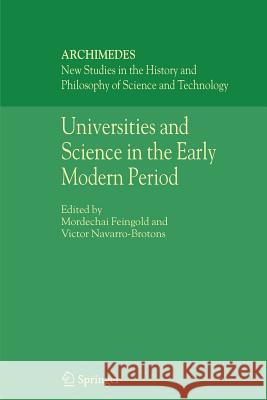Universities and Science in the Early Modern Period » książka
Universities and Science in the Early Modern Period
ISBN-13: 9789048170043 / Angielski / Miękka / 2010 / 310 str.
This book includes most of the contributions presented at a conference on "Univ- sities and Science in the Early Modern Period" held in 1999 in Valencia, Spain. The conference was part of the "Five Centuries of the Life of the University of Valencia" (Cinc Segles) celebrations, and from the outset we had the generous support of the "Patronato" (Foundation) overseeing the events. In recent decades, as a result of a renewed attention to the institutional, political, social, and cultural context of scienti?c activity, we have witnessed a reappraisal of the role of the universities in the construction and development of early modern science. In essence, the following conclusions have been reached: (1) the attitudes regarding scienti?c progress or novelty differed from country to country and follow differenttrajectoriesinthecourseoftheearlymodernperiod;(2)institutionsofhigher learning were the main centers of education for most scientists; (3) although the universities were sometimes slow to assimilate new scienti?c knowledge, when they didsoithelpednotonlytoremovethesuspicionthatthenewsciencewasintellectually subversivebutalsotomakesciencearespectableandevenprestigiousactivity;(4)the universities gave the scienti?c movement considerable material support in the form of research facilities such as anatomical theaters, botanical gardens, and expensive instruments; (5) the universities provided professional employment and a means of support to many scientists; and (6) although the relations among the universities and the academies or scienti?c societies were sometimes antagonistic, the two types of institutionsoftenworkedtogetherinharmony, performingcomplementaryratherthan competing functions; moreover, individuals moved from one institution to another, as did knowledge, methods, and scienti?c practices.











